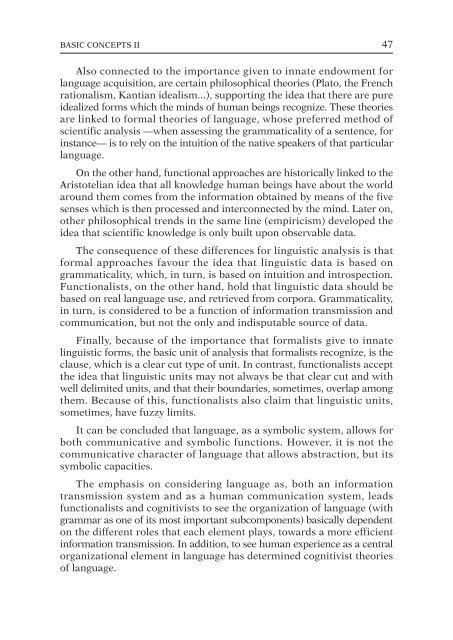Semantics
You also want an ePaper? Increase the reach of your titles
YUMPU automatically turns print PDFs into web optimized ePapers that Google loves.
BASIC CONCEPTS II 47<br />
Also connected to the importance given to innate endowment for<br />
language acquisition, are certain philosophical theories (Plato, the French<br />
rationalism, Kantian idealism...), supporting the idea that there are pure<br />
idealized forms which the minds of human beings recognize. These theories<br />
are linked to formal theories of language, whose preferred method of<br />
scientific analysis —when assessing the grammaticality of a sentence, for<br />
instance— is to rely on the intuition of the native speakers of that particular<br />
language.<br />
On the other hand, functional approaches are historically linked to the<br />
Aristotelian idea that all knowledge human beings have about the world<br />
around them comes from the information obtained by means of the five<br />
senses which is then processed and interconnected by the mind. Later on,<br />
other philosophical trends in the same line (empiricism) developed the<br />
idea that scientific knowledge is only built upon observable data.<br />
The consequence of these differences for linguistic analysis is that<br />
formal approaches favour the idea that linguistic data is based on<br />
grammaticality, which, in turn, is based on intuition and introspection.<br />
Functionalists, on the other hand, hold that linguistic data should be<br />
based on real language use, and retrieved from corpora. Grammaticality,<br />
in turn, is considered to be a function of information transmission and<br />
communication, but not the only and indisputable source of data.<br />
Finally, because of the importance that formalists give to innate<br />
linguistic forms, the basic unit of analysis that formalists recognize, is the<br />
clause, which is a clear cut type of unit. In contrast, functionalists accept<br />
the idea that linguistic units may not always be that clear cut and with<br />
well delimited units, and that their boundaries, sometimes, overlap among<br />
them. Because of this, functionalists also claim that linguistic units,<br />
sometimes, have fuzzy limits.<br />
It can be concluded that language, as a symbolic system, allows for<br />
both communicative and symbolic functions. However, it is not the<br />
communicative character of language that allows abstraction, but its<br />
symbolic capacities.<br />
The emphasis on considering language as, both an information<br />
transmission system and as a human communication system, leads<br />
functionalists and cognitivists to see the organization of language (with<br />
grammar as one of its most important subcomponents) basically dependent<br />
on the different roles that each element plays, towards a more efficient<br />
information transmission. In addition, to see human experience as a central<br />
organizational element in language has determined cognitivist theories<br />
of language.



